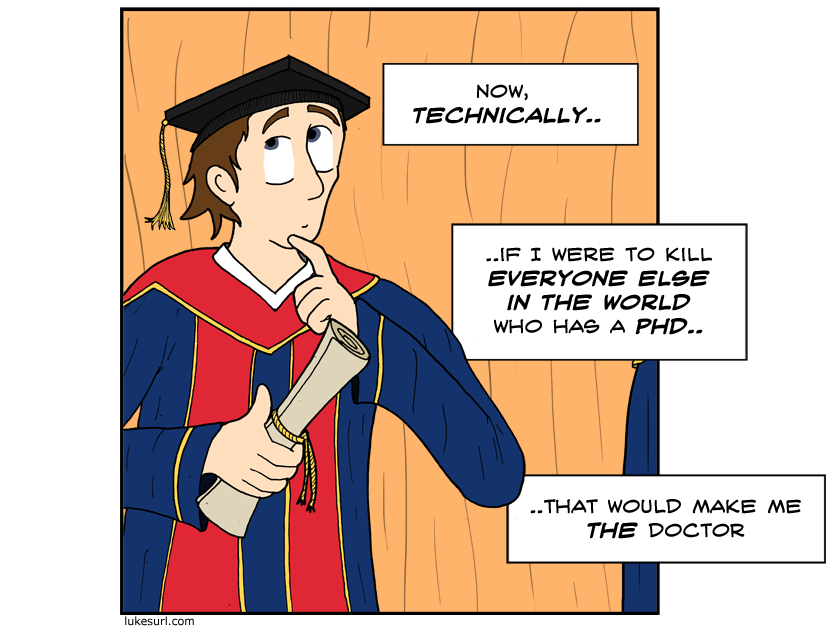Masters Degree Vs Doctoral (Ph.d)

When students attend college they mainly stop at the bachelors degree level because some might not see the importance of a masters or doctoral degree or they might feel its too expensive and hard to attain. Well the choice is up to you and it should not be too difficult to decide, once you understand the differences among the two major degree types and how it will aid your future. When considering the merits of a masters versus a doctoral degree, bear in mind that both will give you in-depth training in a specialized field. The usefulness of each degree depends on your academic and career interests. The higher the degree, the longer it takes to earn and the more specialized is its focus. For that reason, it's best to first look at what a doctorate is. Once you understand the relatively narrow scope and use of a doctorate, you may have an easier time understanding the masters by comparison.
The most common doctorate is the Doctor of Philosophy or Ph.D. Ph.D.s and other research doctorates prepare students to initiate new projects that add to the collective knowledge base of the field. Candidates for and holders of Ph.D.s often seek careers as professors and researchers, but many also go on to varied roles in the nonprofit, public, and private sectors.
Going to graduate school for any degree and in any field, you should be prepared for a different experience from your undergraduate years. When you enroll in a graduate degree program, it's best to be motivated by professional and academic goals, and in many fields, to have a few years of work experience under your belt.
Students entering a Ph.D. program have already earned a bachelor's degree, and sometimes also a masters degree (depending on the Ph.D. program). Because of the nature of specialization, Ph.D. programs tend to be smaller than masters programs.
Ph.D. candidates begin by taking courses and exams, go on to taking advanced seminars and designing dissertation research, and complete their requirements by researching, writing, and defending a dissertation. A dissertation is the doctoral-level thesis, the culmination of a Ph.D. candidate's research into a topic, and typically the major requirement of earning the doctorate. Unfortunately, failure to complete the dissertation is a major reason some doctoral candidates don't complete their studies, but may claim "ABD" (All But Dissertation) on their resumes.
Doctorates may take up to eight years to earn—depending on the program, whether the student has already completed a masters degree (or is coming straight from undergraduate), and how long the student takes to write the dissertation.
A Ph.D. typically demonstrates a person's competence in research and qualifies them to become professors. It can also prepare them to play other roles (such as developing policy) in the nonprofit, public, and private sectors. Doctoral study offers a unique opportunity for an individual to conduct intensive and prolonged research on a very particular topic, which often leads to publication. Other reasons exist to get a Ph.D.—such as the desire to be called "Doctor," or the romantic notion of being a Ph.D. candidate at a prestigious institution—but these reasons pale in the light of the hard work and long years it takes to earn the distinction, if your professional goals do not require it.
Masters degrees are more versatile than doctoral degrees, and have a wide range of professional and academic applications. Research masters degrees are typically for academic and applied research disciplines. Examples of the research masters degree include Master of Arts in History, Master of Arts in Comparative Literature, and Master of Science in Biology. In some fields, earning a research masters degree without going on to earn a Ph.D. severely restricts your professional options. If you are considering a research masters degree, discuss your educational options and career trajectory with professors or professionals in your field.
Professional masters degrees prepare a person to do professional work by introducing practical skills and frameworks for understanding issues in their field. Professional masters degrees may also qualify a person to practice in their field (Master of Social Work, Master of Architecture, or Master of Art in Teaching, for example).
Masters programs typically take one to three years. Students entering
a masters degree program have already earned a bachelors degree, and so
masters candidates take advanced-level courses and seminars. In some
programs, students go on to research, write, and defend a masters
thesis. In professional masters programs, the thesis is often replaced
by final projects and exams.
The variety of masters degrees is vast, as are the purposes and uses of each. Masters degrees prepare a person for a range of pursuits through specialized study of a field.
Research masters enhance a student's research skills, prepare them for a Ph.D. program, and may help qualify them to teach in elementary, secondary, and community education settings. Professional masters degrees teach students skills they will need as practitioners in their respective fields, and may lead to credentials necessary to practice in the field.
In : Education
Tags: "masters degree vs doctorate"
